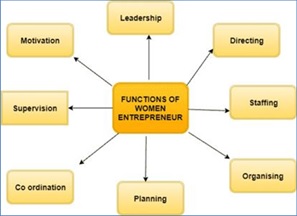
Of a variety of engagements women can be involved, peculiarly these days; entrepreneurship is dramatically rising and providing women with ample opportunity to bring about change in all aspects. Women entrepreneurs play a significant role in economic growth and job creation, and are important indicator of growth and development. Their entrepreneurial engagement does have a number of advantages.
To mention, but a few: reducing poverty and inequality, empowering women private enterprise which can help reduce poverty and inequality by creating jobs, boosting economic advancement and overall prosperity.
Putting this clear fact in mind, The Ethiopian Herald approached Almaz Shamena, an economist graduated from Bahir Dar University, and working as an entrepreneur for the time being, to have a piece of information regarding women’s role in helping the job opportunity strata grow and their contribution to the comprehensive economic growth of the country.
“The development of women’s entrepreneurship is still a largely untapped potential for growth and prosperity. Furthermore, the economic role of women is crucial for growth and a more equitable distribution of wealth. Economic opportunities are much more important for women today than the previous generation, especially for developing countries like ours. In this regard, the impact of women’s entrepreneurship on economic growth is an important area reflecting broader interests in gender equality, economic development and human resource optimization,” she said.
She said, “Women entrepreneurship can be a powerful driver of economic growth, and can contribute to a more equitable distribution of wealth via creating jobs, intensifying innovation, expanding community investment. Besides, women-owned businesses create jobs, which can help alleviate poverty and unemployment. In essence of this, women entrepreneurs can add diversity and creativity to a country’s entrepreneurial mix, which can intensify competition and lead to innovation.”
As far as community investment is concerned, she said women-owned businesses are more likely to invest in their communities and prioritize social and environmental responsibility. As women entrepreneurs face many challenges like limited access to finance, incomplete technology, limited space and human resource, insufficient support from family members and spouses, lack of necessary skills, education, experience, and training. Societal patriarchal norms are also highly challenging their active engagement and profitability, which call the government to take apt measures along that line.
According to her, encouraging more women to become entrepreneurs can help make economies fairer and increase national, continental and even global economic development. “Women are untapped resources for economic growth. Female entrepreneurs, like their male counterparts, can boast the economic growth of a country. Women owned business creates jobs which results in poverty alleviation and eradication of unemployment. Similarly, women entrepreneurs add diversity to the entrepreneurial mix of a country. Female entrepreneurs intensify competition through creativity and innovation.”
Besides, Almaz said the institutional profile and overall business environment of any country have significant role in women business start-ups.
The relationship between female entrepreneurship and national competiveness level has to be moderated by overall business environment of the country, and active participation of women in economic activities is necessary for development of any country, obvious. As many have confirmed; she added that countries with low participation of women are characterized by underutilization of the resources which has profound effect on their economic growth.
Undeniably, in the past, entrepreneurship was considered to be male dominated; but now the government, policy makers and overall population is giving due attention to female entrepreneurs. Following this step female owned businesses are expanding in many parts of the nation, and women are considered to be fast growing entrepreneurial population though there are gaps that need to be bridged regarding a number of issues apart from the aforesaid concerns, she added.
Entrepreneurs in general and women entrepreneurs in particular create new business which results in more jobs thereby reducing unemployment as entrepreneurs rely more on the human capital to achieve sustainable competitive advantage rather than the accumulation of physical factors of production. Female entrepreneurs are not exception.
As to Almaz, entrepreneurs intensify the competition by encouraging new entrants and upgrading the existing technologies. Yes, technological competitiveness involves development of new products and services and is cost competitiveness which entails replacement of human capital with traditional factors of production. Therefore, new business ventures result in fostering economic development through competition and innovation.
It is also recommended that Ethiopia should put in place appropriate legislative frameworks that will allow the women entrepreneurs risk taking, competitiveness and innovativeness to flourish which will in turn result to increased economic development of the region, Almaz opined.
According to Almaz, the other crucial fashion that has to be altered soon is despite the fact the women entrepreneurship is on rise, they operate in low growth sectors. Due to many individual, socio-cultural and economic constraints, female entrepreneurs are limited to micro-enterprises.
True, Almaz added regulatory and financial institutions are important for business activities as they directly and indirectly affect the demand and supply of entrepreneurs. Therefore, whether entrepreneurial initiatives are productive, non-productive or even destructive depends upon the development of institutions. Given the importance of institutions, female entrepreneurial activities are closely related with the institutional system of a country.
As to her, given the importance of female entrepreneurship in economic growth of a country, Ethiopia has attached due emphasis to women entrepreneurship and women empowerment. Gender-specific obstacles such as societal norms, access to finance and imposter syndrome act as a glass ceiling that prevents female entrepreneurs from reaching their full potential. These barriers must be removed. By fostering women entrepreneurship through support programs and early-stage financing that specifically targets women, policymakers can help to grow economies for everyone.
Overcoming pitfalls of course will require interventions from policymakers and other actors in the entrepreneurship ecosystem, including the creation of mentoring programs, as well as providing targeted financing and growth support strategies to female entrepreneurs.
Since the technological innovation promotes a healthy competition between the firms which results in either lower cost or better quality of product, entrepreneurship is generally regarded as a positive phenomenon, she added.
“Female entrepreneurs just like their male counterparts also intensify competition between firms operating in same market. In order to achieve rapid economic development, it is imperative to create opportunities and supportive environment for female entrepreneurs because the overall business environment and the growth orientation of the entrepreneurs have significant influence on the growth of a dynamic organization as well as the country. Women entrepreneurs can increase the competiveness level in a country through creativity and innovation which boasts economic performance,” Almaz underscored.
It is quite true and well attested that a special focus on generating more opportunities for female entrepreneurs will result in financial independence, social empowerment, and economic development of women.
In a nutshell, women entrepreneurs contribute to wealth production, human development, education and health as well as the entire societal proliferation. Basically, there are many ways to support women entrepreneurs. Promoting their business acceptance, which means women entrepreneurs can gain community acceptance by understanding local rules and expectations, and using personal connections.
As far as improving government support is concerned, the government can enact policies and initiatives to maintain women entrepreneurs, such as providing training, mentoring, and financial assistance. Besides, addressing challenges is another thematic area.
BY MENGESHA AMARE
THE ETHIOPIAN HERALD SATURDAY 21 DECEMBER 2024





